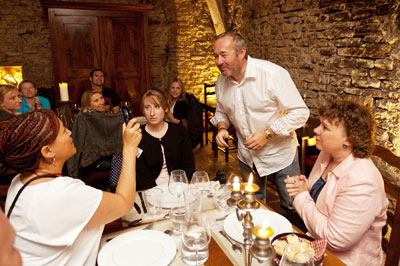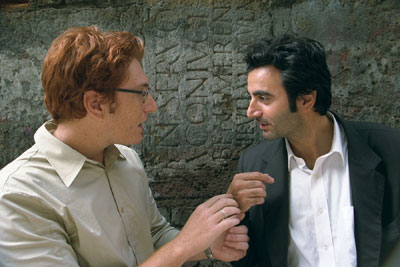International communication goes beyond words
This item appears on page 58 of the January 2014 issue.
The language barrier used to be a big problem for American travelers. I remember leading tour groups through France and was constantly impressed at how Americans expected the French to speak English. People would go to the post office in some little town and be frustrated because there was no help in English and the people weren’t friendly. I had to explain to them that small-town French postal clerks are every bit as speedy, cheery and multilingual as they are here in the USA.
In the last generation, however, English has become the common language of travel. In Europe these days, anyone who’s young, well educated or working in tourism is very likely to speak English, and many signs and menus are in English as well.
But even when you have to resort to pantomime skills, it’s satisfying — and fun — to bridge the language barrier. Despite more than 30 summers of travel through Europe, I’m still a monoglot and yet manage to connect with the local people wherever I go.
It’s polite to, at least, begin your encounters and transactions by trying to speak in the language of the country you’re visiting. Learn and use the words for ‘Hello,’ ‘Excuse me,’ ‘Please,’ ‘Thank you’ and ‘Good-bye.’
I start conversations by asking “Do you speak English?” in the local language. In France, it’s “Parlez-vous anglais?” and in Germany, “Sprechen Sie Englisch?”
For help, carry a small dictionary or a phrase book with a menu reader — either in print or on your smartphone — and a good supply of patience.
If the person doesn’t speak English, I do my best in his language. Generally, after I butcher a couple of sentences, he’ll say, “Actually I do speak a little English.”
Okay, your friend is speaking your language. Do him a favor by speaking slowly and clearly. Enunciate. No slang, no contractions. Keep things caveman simple. Instead of asking, “Can I take your picture?,” point to your camera and ask, “Photo?”
Risk looking like a fool. To get airmail stamps, you can flap your arms like wings and say, “Tweet, tweet.” If you want milk, moo and pull two imaginary udders. Remember that self-consciousness is the deadliest communication killer. With gestures and thoughtfully simplified words, you’re communicating.
Plan ways to connect with locals. Take photos from home and introduce your family. Play cards or toss a Frisbee. Pull out a small notepad and draw what you mean.
Communication requires an awareness of culture as well as words. For example, the French value politeness. Begin every encounter with “Bonjour (or S’il vous plait), madame (or monsieur),” and end every encounter with “Au revoir, madame (or monsieur).” The key is to go for it with a mixture of bravado and humility.
When you do make an effort to speak French, expect to be politely corrected — c’est normal. The French are language perfectionists. They take their language (and other languages) seriously. Because of this, they may be timid about speaking English less than fluently, so they might actually know more English than they let on — and you’ll probably find they speak more English than you speak French.
In contrast, Italians have an endearing habit of talking to you even if they know you don’t speak their language. They’re very animated when they speak. You may think two Italians are arguing, when in reality they’re agreeing enthusiastically. Don’t stop them to say you don’t understand every word; just go along for the ride.
Every language is spoken in its own way. A German friend observed that the Spanish and Italians speak as if talking to God, the French speak as if talking to a lover, and the Germans speak as if talking to a dog. Germans seem to be barking, even when agreeing with you: “Stimmt! Genau! Richtig!”
Personally, I like the sound of German, but, as I told my friend, the language is difficult for me. My friend said, “German is easy! Even children speak it.”
If you don’t find languages easy, though, remember that wherever you travel, you’re surrounded by expert, native-speaking tutors. Spend bus and train rides letting them teach you. Listen to each language and imitate. Be melodramatic. Exaggerate the local accent. Practice and have fun with it. It can be intimidating at first, but a bold spirit of adventure, a dollop of common sense and a big smile will take you a long way.
The most important thing is to never allow your lack of foreign language skills to isolate you from the people and cultures you traveled halfway around the world to experience. Long after your memories of museums have faded, you’ll still treasure the personal encounters you had with your new European friends.


